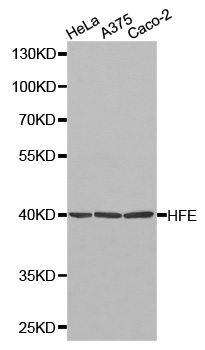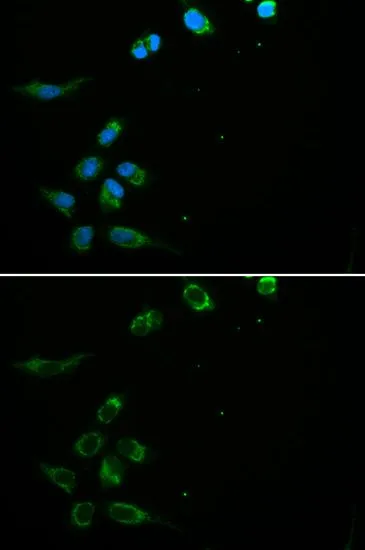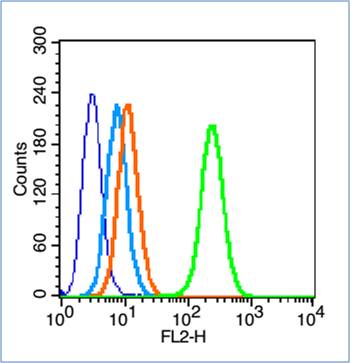![WB analysis of human HFE (AA: 125-282) recombinant protein using GTX60503 HFE antibody [3F1]. WB analysis of human HFE (AA: 125-282) recombinant protein using GTX60503 HFE antibody [3F1].](https://www.genetex.com/upload/website/prouct_img/normal/GTX60503/GTX60503_20170912_WB_1_w_23061123_379.webp)
WB analysis of human HFE (AA: 125-282) recombinant protein using GTX60503 HFE antibody [3F1].
HFE antibody [3F1]
GTX60503
ApplicationsImmunoFluorescence, Western Blot, ELISA, ImmunoCytoChemistry
Product group Antibodies
ReactivityHuman
TargetHFE
Overview
- SupplierGeneTex
- Product NameHFE antibody [3F1]
- Delivery Days Customer9
- Application Supplier NoteWB: 1/500 - 1/2000. ICC/IF: 1/200 - 1/1000. ELISA: 1/10000. *Optimal dilutions/concentrations should be determined by the researcher.Not tested in other applications.
- ApplicationsImmunoFluorescence, Western Blot, ELISA, ImmunoCytoChemistry
- CertificationResearch Use Only
- ClonalityMonoclonal
- Clone ID3F1
- ConjugateUnconjugated
- Gene ID3077
- Target nameHFE
- Target descriptionhomeostatic iron regulator
- Target synonymsHFE1, HH, HLA-H, MVCD7, TFQTL2, hereditary hemochromatosis protein, MHC class I-like protein HFE, hereditary hemochromatosis protein HLA-H, high Fe
- HostMouse
- IsotypeIgG1
- Protein IDQ30201
- Protein NameHereditary hemochromatosis protein
- Scientific DescriptionThe protein encoded by this gene is a membrane protein that is similar to MHC class I-type proteins and associates with beta2-microglobulin (beta2M). It is thought that this protein functions to regulate iron absorption by regulating the interaction of the transferrin receptor with transferrin. The iron storage disorder, hereditary haemochromatosis, is a recessive genetic disorder that results from defects in this gene. At least nine alternatively spliced variants have been described for this gene. Additional variants have been found but their full-length nature has not been determined. [provided by RefSeq, Jul 2008]
- ReactivityHuman
- Storage Instruction-20°C or -80°C,2°C to 8°C
- UNSPSC41116161

![WB analysis of HEK293 (1) and HFE(AA: 125-282)-hIgGFc transfected HEK293 (2) cell lysate using GTX60503 HFE antibody [3F1]. WB analysis of HEK293 (1) and HFE(AA: 125-282)-hIgGFc transfected HEK293 (2) cell lysate using GTX60503 HFE antibody [3F1].](https://www.genetex.com/upload/website/prouct_img/normal/GTX60503/GTX60503_20170912_WB_w_23061123_759.webp)
![ICC/IF analysis of HepG2 cells using GTX60503 HFE antibody [3F1]. Green : HFE Blue: DRAQ5 fluorescent DNA dye ICC/IF analysis of HepG2 cells using GTX60503 HFE antibody [3F1]. Green : HFE Blue: DRAQ5 fluorescent DNA dye](https://www.genetex.com/upload/website/prouct_img/normal/GTX60503/GTX60503_20170912_ICCIF_w_23061123_750.webp)
![ELISA analysis of antigen using GTX60503 HFE antibody [3F1].
Red : Control antigen 100ng
Purple : Antigen 10ng
Green : Antigen 50ng
Blue : Antigen 100ng ELISA analysis of antigen using GTX60503 HFE antibody [3F1].
Red : Control antigen 100ng
Purple : Antigen 10ng
Green : Antigen 50ng
Blue : Antigen 100ng](https://www.genetex.com/upload/website/prouct_img/normal/GTX60503/GTX60503_20170912_ELISA_w_23061123_984.webp)




![Various whole cell extracts (30 μg) were separated by 10% SDS-PAGE, and the membrane was blotted with HFE antibody [HL2155] (GTX638133) diluted at 1:1000. The HRP-conjugated anti-rabbit IgG antibody (GTX213110-01) was used to detect the primary antibody. Corresponding RNA expression data for the same cell lines are based on Human Protein Atlas program.](https://www.genetex.com/upload/website/prouct_img/normal/GTX638133/GTX638133_44998_20230331_WB_TPM_watermark_23041023_949.webp)


